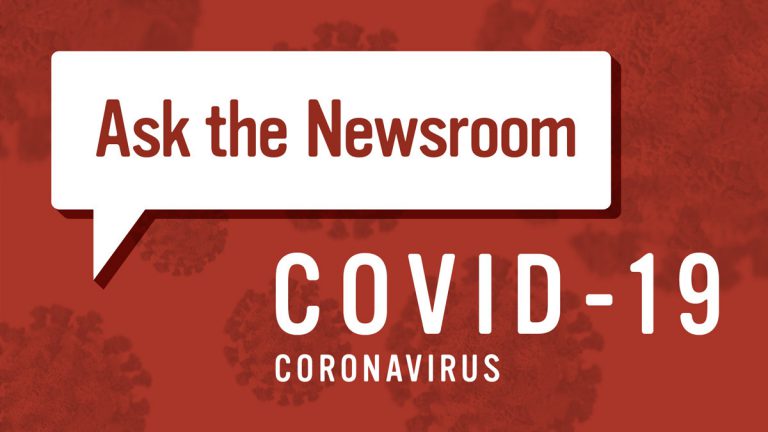The Illinois Newsroom team is answering questions from listeners to navigate this unprecedented time. Have a question you want answered? Ask here.
In today’s edition of “Ask the Newsroom,” we’ve answered questions on COVID-19, SNAP benefits and living alone.
Please note, the information is accurate as of June 19, 2020.
COVID-19 Testing
Q: I am planning on going down to watch my grandchildren for this week and will be driving past Champaign-Urbana on my way home. Will I be able to get a free test on my way home on Friday so I don’t end up exposing my 84-year-old mother or my husband? I am a Wisconsin resident.
Yes. Community-based testing sites are open to anyone, regardless of residency or symptoms. Champaign-Urbana Public Health Administrator Julie Pryde says she wants anyone visiting the community to be tested. Pryde says you can test on the day you arrive and the day you leave, and she recommends getting tested five to seven days after possible exposure. Staff at the Illinois Department of Public Health will call you with the results soon after getting tested. You can find the list of testing sites and hours of operation here.
Q: If I get tested for coronavirus and test positive, is it recorded as a statistic in the county in which I was tested or in the county in which I live? In other words, if I work in an adjoining county and I get tested there, and it shows positive, is it recorded as being in that county or are they counting in in the county which I actually live?
Positive COVID-19 cases are reported in the county in which someone lives, regardless of where they get tested, according to Pryde. She says deaths and hospitalizations are also recorded in the counties in which people live.
Update On June SNAP Benefits
Q: Will there be more SNAP benefits extended through June? Last I heard it ends in May.
Yes, the Illinois Department of Human Services (IDHS) will provide the maximum amount of benefits to the more than 450,000 households in Illinois that rely on food stamps.
This month the additional benefits will be made available beginning June 19th through the end of the month. Those who typically receive their allotment on the 1st of the month will therefore receive it on the 19th this month. Those who receive on the 2nd will receive on the 20th, and so on. An allotment schedule can be found here.
This additional funding is intended to provide assistance to families who are experiencing financial hardship amid the coronavirus pandemic, and is provided through the Families First Coronavirus Response Act of 2020. Maximum benefits were also provided in April and May.
Those who are already enrolled in SNAP don’t need to take any additional action to receive the benefits, they’ll be provided automatically. To apply for benefits, visit the IDHS website. For information on SNAP benefits for July and beyond visit here.
Moving Into Phase 4
Q: When will Illinois move into Phase 4?
There has been no set date for the start of Phase 4 in the Restore Illinois plan, but Gov. J.B. Pritzker says all four of the state’s regions are on track to reach Phase 4 by next week. The governor had previously stated the earliest the state could enter Phase 4 would be June 26.
According to the Restore Illinois plan, in order for the state to move into Phase 4, all regions would need to meet certain measures of hospital surge capacity. Regions will have to be at or under a 20% positivity rate, and will need to see no overall increase in hospital admissions over the course of 28 days. There would also need to be an available surge capacity of 14% or less of ICU beds and ventilators.
Seeking Assistance When Isolated
Q: I’m retired and live alone after my husband passed. What should I do if I get coronavirus and can’t go shopping for myself anymore?
There are several programs to support people in need who get sick with COVID-19. Champaign-Urbana Public Health District (CUPHD) follows everyone who has tested positive for the virus every day throughout the 14 days of their isolation and quarantine, says Public Health Administrator Julie Pryde. She says CUPHD also provides food and other items as needed.
Macon County Public Health Administrator Brandi Binkley says it’s also possible to receive aid during isolation/quarantine by calling 2-1-1, calling Starting Point (if the person is in Macon County), or expressing needs to the contact tracer or nurse who is working with the person during isolation.
OSF Healthcare also offers a Pandemic Health Worker Program, which digitally connects pandemic health workers with people who have tested positive for COVID-19. Through the program, health workers can deliver a health kit (including a tablet, health education materials, a thermometer and hand sanitizer) to people’s homes, and will digitally visit with the person twice a day for 16 days to check on their needs.

